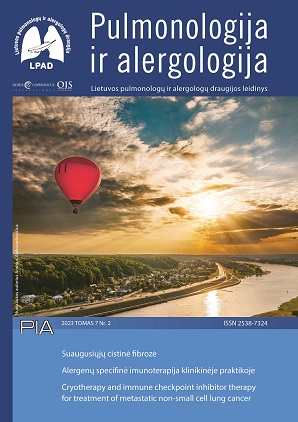Skubioji pagalba vaikams astmos paūmėjimo metu
Santrauka
Astma vaikų amžiuje yra viena dažniausių lėtinių uždegiminių kvėpavimo takų ligų. Astmos paūmėjimas – tai staigus astmos simptomų paūmėjimas, kuris neretai sukelia respiracinį distresą. Dažnai įprastas gydymasastmos paūmėjimo metu gali būti neveiksmingas, todėl tokiu atveju vaikai kreipiasi į vaikų skubiosios pagalbos skyrių. Pagrindiniai astmos paūmėjimo veiksniai yra įvairūs. Virusinės kvėpavimo takų infekcijos – vienos dažniausių provokacinių veiksnių. Kiti veiksniai: alergenai, oro užterštumas, rūkymas, bloga astmos kontrolė. Astmos paūmėjimo metu pagalbos eiga – greitas ir objektyvus simptomų įvertinimas bei tiksli diferencinė diagnostika, tinkamai skirtas medikamentinis gydymas ir gyvybinių funkcijų užtikrinimas, siekiant pagerinti oksigenaciją, sumažinti respiracinio distreso simptomus bei ligos atkryčio riziką, būklės vertinimas dinamikoje, pagalbos teikimas pagal stebimą būklę, tolesnio gydymo plano sudarymas. Pagrindiniai astmos paūmėjimo gydymo principai: hipoksemijos korekcija, bronchospazmo sumažinimas, kvėpavimo takų uždegimo valdymas, būklės vertinimas dinamikoje, tolesnio gydymo stacionare indikacijų vertinimas, kitas gydymas (pvz., antipiretikai, pakankamo skysčių kiekio užtikrinimas), tolesnių paciento veiksmų planas. Po astmos paūmėjimo pacientą išleidžiant į namus, būtina suformuluoti aiškias ir tikslias tolesnes rekomendacijas, ką ir kaip vartoti namuose, kada kreiptis į šeimos gydytoją arba gydytoją specialistą.


